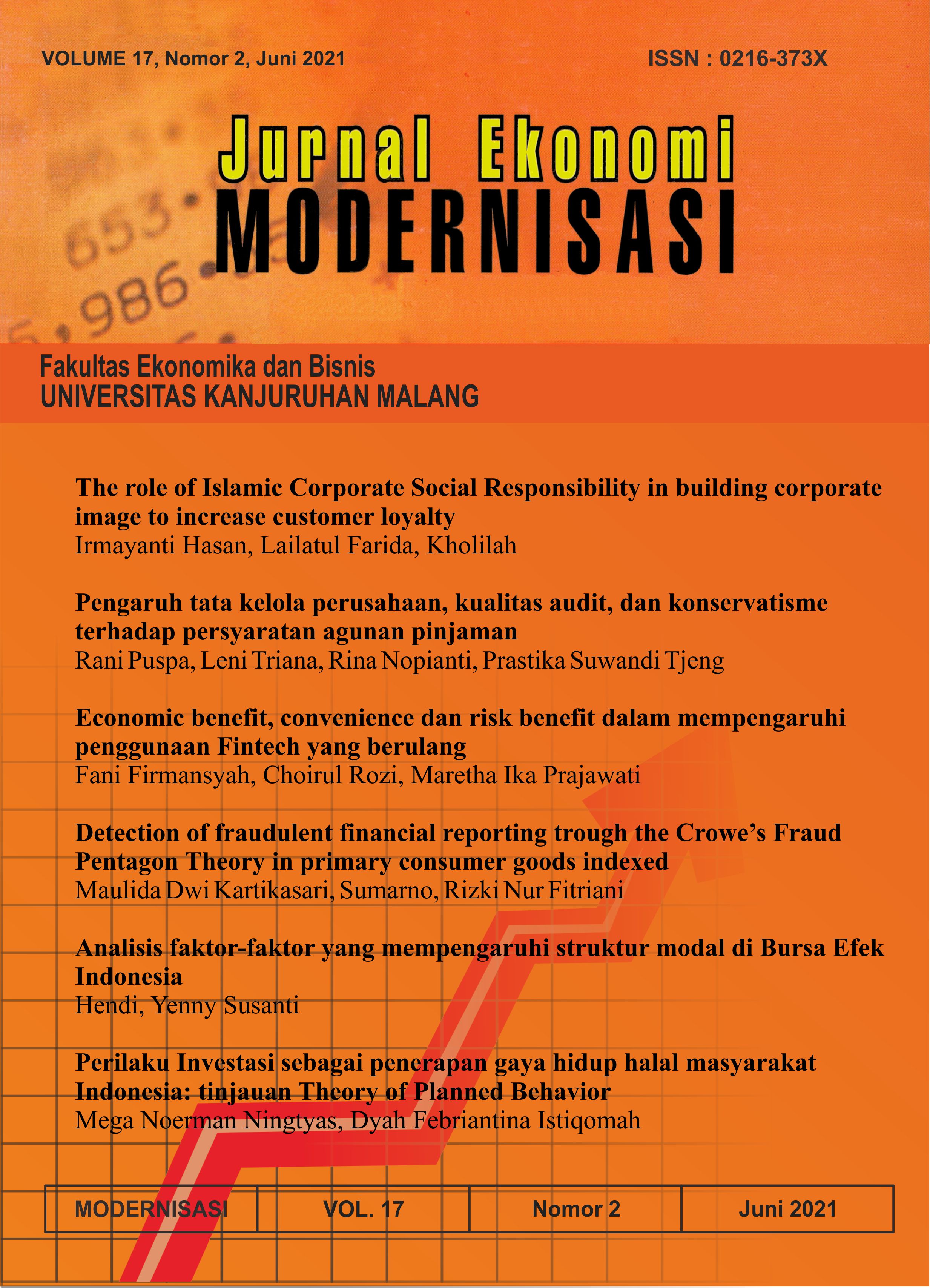Pengaruh tata kelola perusahaan, kualitas audit, dan konservatisme terhadap persyaratan agunan pinjaman
Main Article Content
Abstract
Debtors and creditors have equal access to information about default risks in competitive credit markets. Loan collateral is less important in credit decision-making in these circumstances. However, in emerging credit markets such as Indonesia, where debtors and creditors do not have equal information about a firm's prospects, the use of collateral to mitigate default risk has become common practice. Despite the strong theoretical framework for the use of collateral to secure creditors from credit risk, some Indonesian firms are exempt from providing collateral for bank debts. This study looks at how the independence of the Board of Commissioners, governance committees, audit quality, and conservatism affect the likelihood of using debt collateral. Around 785 firms listed on the Indonesia Stock Exchange were collected using Slovin's formula, during the sample period of 2017-2020. According to logistic regression analysis, firms with a more independent Board of Commissioners, a separate governance committee, Big 4 auditors, and conservative accounting policies are less likely to provide loan collateral
Downloads
Article Details
Authors who submit a manuscript understand that if the manuscript is accepted for publication, the copyright of the article shall be assigned to Jurnal Ekonomi Modernisasi (JEM).
References
Allen, F., Qian, J., & Qian, M. (2015). Law, finance, and economic growth in China. Journal of Financial Economics, 77(1), 57–116. https://doi.org/10.1016/j.jfineco.2004.06.010
An, C., Pan, X., & Tian, G. (2016). How Does Corporate Governance Affect Loan Collateral? Evidence from Chinese SOEs and Non-SOEs. International Review of Finance, 16(3), 325–356. https://doi.org/10.1111/irfi.12085
Ball, Ray, Robin, A., & Sadka, G. (2018). Is financial reporting shaped by equity markets or by debt markets? An international study of timeliness and conservatism. Review of Accounting Studies, 13(2–3), 168–205. https://doi.org/10.1007/s11142-007-9064-x
Ball, Ray, & Shivakumar, L. (2015). Earnings quality in UK private firms: comparative loss recognition timeliness. Journal of Accounting and Economics, 39(1), 83–128. https://doi.org/10.1016/j.jacceco.2004.04.001
Ball, Ryan, Bushman, R. M., & Vasvari, F. P. (2018). The Debt-Contracting Value of Accounting Information and Loan Syndicate Structure. Journal of Accounting Research, 46(2), 247–287. https://doi.org/10.1111/j.1475-679x.2008.00273.x
Beatty, A., Weber, J., & Yu, J. J. (2018). Conservatism and Debt. Journal of Accounting and Economics, 45(2–3), 154–174. https://doi.org/10.1016/j.jacceco.2008.04.005
Chen, H., Chen, J. Z., Lobo, G. J., & Wang, Y. (2016). Association between borrower and lender state ownership and accounting conservatism. Journal of Accounting Research, 48(5), 973–1014. https://doi.org/10.1111/j.1475-679X.2010.00385.x
Chen, J. Z., Lobo, G. J., Wang, Y., & Yu, L. (2013). Loan collateral and financial reporting conservatism: Chinese evidence. Journal of Banking & Finance, 37(12), 4989–5006. https://doi.org/10.1016/j.jbankfin.2013.09.003
Chen, L. H., Folsom, D. M., Paek, W., & Sami, H. (2013). Accounting Conservatism, Earnings Persistence, and Pricing Multiples on Earnings. Accounting Horizons, 28(2), 233–260. https://doi.org/10.2308/acch-50664
DeFond, M., & Zhang, J. (2014). A review of archival auditing research. Journal of Accounting and Economics, 58(2–3), 275–326. https://doi.org/10.1016/j.jacceco.2014.09.002
Elekdag, S., & Gelos, G. (2016). Corporate governance and financial stability in emerging markets. In VOX, CEPR Policy Portal.
Feltham, G. A., & Ohlson, J. A. (2015). Valuation and Clean Surplus Accounting for Operating and Financial Activities. Contemporary Accounting Research, 11(2), 689–731. https://doi.org/10.1111/j.1911-3846.1995.tb00462.x
Foo, Y.-B., & Zain, M. M. (2010). Board independence, board diligence and liquidity in Malaysia: A research note. Journal of Contemporary Accounting & Economics, 6(2), 92–100. https://doi.org/10.1016/j.jcae.2010.10.001
Fowowe, B. (2017). Access to finance and firm performance: Evidence from African countries. Review of Development Finance, 7(1), 6–17. https://doi.org/10.1016/j.rdf.2017.01.006
Francis, B., Hasan, I., & Song, L. (2012). Are Firm- And Country-Specific Governance Substitutes? Evidence From Financial Contracts In Emerging Markets. Journal of Financial Research, 35(3), 343–374. https://doi.org/10.1111/j.1475-6803.2012.01320.x
Fund, I. M. (2019). Global Financial Stability Report. In Global Financial Stability Report. International Monetary Fund. https://doi.org/10.5089/9781498324021.082
Ge, W., Kim, J.-B., & Song, B. Y. (2012). Internal governance, legal institutions and bank loan contracting around the world. Journal of Corporate Finance, 18(3), 413–432. https://doi.org/10.1016/j.jcorpfin.2012.01.006
Jimenez, G., Salas, V., & Saurina, J. (2016). Determinants of collateral☆. Journal of Financial Economics, 81(2), 255–281. https://doi.org/10.1016/j.jfineco.2005.06.003
Khan, U., & Lo, A. K. (2017). Bank Lending Standards and Borrower Accounting Conservatism. SSRN Electronic Journal. https://doi.org/10.2139/ssrn.3037739
Larcker, D. F., Richardson, S. A., & Tuna, I. (2017). Corporate Governance, Accounting Outcomes, and Organizational Performance. The Accounting Review, 82(4), 963–1008. https://doi.org/10.2308/accr.2007.82.4.963
Manove, M., Padilla, A. J., & Pagano, M. (2011). Collateral versus Project Screening: A Model of Lazy Banks. The RAND Journal of Economics, 32(4), 726. https://doi.org/10.2307/2696390
Menkhoff, L., Neuberger, D., & Suwanaporn, C. (2016). Collateral-based lending in emerging markets: Evidence from Thailand. Journal of Banking & Finance, 30(1), 1–21. https://doi.org/10.1016/j.jbankfin.2004.12.004
Mora, A., & Walker, M. (2015). The implications of research on accounting conservatism for accounting standard setting. Accounting and Business Research, 45(5), 620–650. https://doi.org/10.1080/00014788.2015.1048770
Niinimäki, J.-P. (2018). Collateral in credit rationing in markets with asymmetric information. The Quarterly Review of Economics and Finance, 68, 97–102. https://doi.org/10.1016/j.qref.2017.10.001
Osma, B. G., & Grande-herrera, C. (2012). The Role of Independent Directors on Earnings Management : Evidence from Individual Incentives. International Journal of Accounting and Financial Management Research, 2(2), 9–24.
Yang, Y. (2014). Does high-quality auditing decrease the use of collateral? Analysis from the perspective of lenders’ self-protection. China Journal of Accounting Research, 7(3), 203–221. https://doi.org/10.1016/j.cjar.2014.08.003
Ye, K. (2014). Independent director cash compensation and earnings management. Journal of Accounting and Public Policy, 33(4), 391–400. https://doi.org/10.1016/j.jaccpubpol.2014.04.001
Zhang, J. (2018). The contracting benefits of accounting conservatism to lenders and borrowers. Journal of Accounting and Economics, 45(1), 27–54. https://doi.org/10.1016/j.jacceco.2007.06.002
Zhang, Y., Sun, F., & Xian, C. (2017). Does auditor industry expertise affect bank loan costs? Managerial Auditing Journal, 32(3), 295–324. https://doi.org/10.1108/maj-07-2015-1230
Zimmermann, J., & Goncharov, I. (2003). Do Accounting Standards Influence the Level of Earnings Management? Evidence from Germany. SSRN Electronic Journal. https://doi.org/10.2139/ssrn.386521
